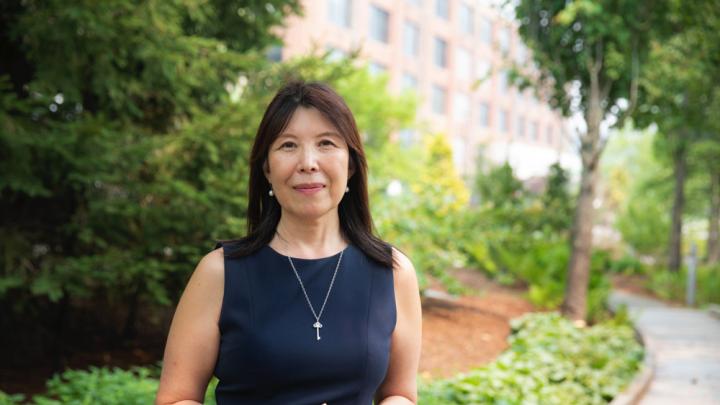Construction began today on a state-of-the-art biomanufacturing facility in a 40,000-square-foot leased space at the Watertown Arsenal, a few miles west of Harvard Square, culminating a several-year process of developing a Boston-area research collaborative. Ran Zheng, a veteran of the biotechnology industry, has been appointed CEO of the company, which will help develop emerging cell- and gene-based therapies for human use. Founded and led by Harvard, MIT, Cytiva (formerly part of GE Healthcare Life Sciences), FUJIFILM Diosynth Biotechnologies, and Alexandria Real Estate (a developer of labs and offices), the company was recently renamed Landmark Bio (formerly, the Center for Advanced Biological Innovation and Manufacturing). Five Harvard-affiliated hospitals—Brigham and Women’s, Massachusetts General Hospital, the Dana-Farber Cancer Institute, Boston Children’s, and Beth Israel Deaconess Medical Center—are collaborating institutions, together with the Massachusetts Life Sciences Center. (MilliporeSigma, a provider of industrial and lab chemicals, is apparently no longer formally involved.)
Zheng, a chemical engineer by training, has extensive experience in biotechnology process development, including Good Manufacturing Practices (GMP), a U.S. Food and Drug Administration certification necessary for most human therapies that is recognized by pharmaceutical companies and regulatory agencies worldwide. In addition to GMP manufacturing capacity (including the ability to create mRNA therapies delivered in lipid nanoparticles—an approach made famous by the Moderna and Pfizer coronavirus vaccines), the facility will include innovation and process development laboratories that will help researchers from academic, healthcare, and industry partners turn their research discoveries and laboratory protocols into products for human use. Warehouse space will be used to store patient and healthy donor materials, as well as therapeutic products destined for clinical testing.
Harvard provost Alan M. Garber, who chairs the board of Landmark Bio and has led the multi-institution collaboration that created it (see “Accelerating Cell Manufacture”), said in a statement that Zheng is “a leader with broad and deep industry expertise and an impressive record of achievement in technology development and global clinical development….The kickoff today on the construction of Landmark Bio’s state-of-the-art facility is just the first step in our collective efforts to innovate in biological manufacturing”—part of Harvard’s efforts to strengthen what is perceived as one of the nation’s leading biomedical and biotechnology research centers.
Although biological therapies are harder to develop than chemical therapies, they are approximately twice as likely to receive regulatory approval as typical small-molecule drugs (which are taken orally, in pill form).







